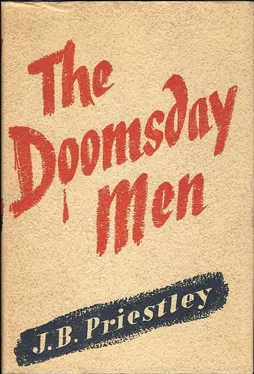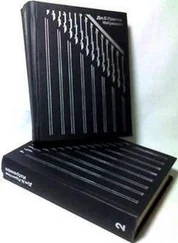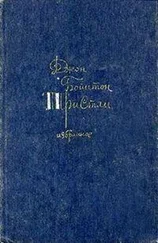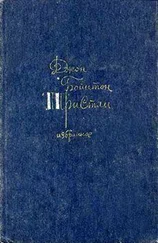“I will,” said Jimmy, and now he began from the beginning and told her all that had happened to him since he landed and all that he knew about the Brotherhood of the Judgment. He had a grand time doing it, too. She was a perfect audience. Sometimes she looked startled, sometimes angry, and sometimes, of course, she laughed, and then he had to laugh too, though he had not been much amused by the actual events; so although in the main it was such a grim and serious business, they did quite a lot of laughing. After the table had been cleared, and the varnish in his new pipe was frizzling nicely, he brought out the package, and together they stared at it.
“Of course it isn’t ours,” he remarked. “No getting away from that. I’ve stolen it.”
She dismissed these qualms at once. “Didn’t they try to kidnap you? It isn’t stealing from people like that, up to any kind of horrible wickedness. And it isn’t as if you wanted whatever’s in there. You-we, because I’m in this now as much as you, Jimmy-we want to see what they’re up to. And I know too they’re up to something. Didn’t I say to you, that very night-and I didn’t know you at all, hadn’t I a nerve, but I had to say something to somebody and you looked all right-but didn’t I say then they were all mad? I saw it in their faces. I hate those sunken eyes, and big noses, and tight mouths. Now let’s open it, shall we?” She laughed then at her curiosity, and was as flushed and eager as a child. “Isn’t this exciting?”
Whatever was inside that package, the people responsible for sending it had been most elaborately careful to ensure that it would arrive intact. They had done a most thorough job of packing. It took Jimmy and Mrs. Atwood about five minutes to unfasten and clear away all the various inner wrappings and layers of packing. But at last the table was bare of everything but the one important object.
“What is it?” asked Mrs. Atwood, with a touch of disappointment in her voice.
“Looks like some sort of scientific apparatus,” said Jimmy, still staring, “but God knows what it’s for.”
It was some kind of long and fat glass tube with metal attachments of various shapes, all bright and beautifully made, at each end. It made no sense to Jimmy, who did not pretend to have any scientific knowledge.
“But what could those people want with a thing like that?” she demanded, looking at it with some disgust.
“It’s my belief,” said Jimmy slowly, for he was still thinking hard, “they were taking it up there for the other brother, the one that young scientist mentioned. But they weren’t just acting as delivery agents, I’m sure of that. I mean to say, the Brotherhood and Father John and the whole works came into this business. I know that by the way they talked about it. They’d had word this thing was tremendously important, whatever it is.”
Involuntarily he glanced across at the window, which was open. They had not troubled to draw the curtains. Outside was the vast impenetrable darkness of night in a remote place. Jimmy frowned at it, then went and drew the curtains.
“Nobody’d come here, you know.” She had guessed his thought. “It doesn’t lead to anywhere. We’re very quiet out here. And we’d hear the dogs if anybody strange was near.”
“Yes, it’s a good place, from one point of view. And a bad one, from another. If somebody did come, they could do what they liked right out here. Is there any chance, do you think, of Kaydick finding I’m out here?”
She thought a moment. “If he went all round Barstow asking if they’d seen you-he could easily describe you, especially as you looked rather a sight-and somebody told him they’d seen us together, then it might be awkward, because of course there are people in Barstow who know I live out here. But even then they’d have to take the chance of wasting a lot of time, coming out as far as this.”
“It doesn’t sound likely, does it?” He was more cheerful now. “Well, we’d better put this object carefully away. Perhaps Charlie might know what it’s for. I’ll try him to-morrow. How long does he take to recover from one of these blinds of his?”
“He’s usually all right by the middle of the next day,” she replied.
The next day proved that she had shrewdly guessed Charlie’s form. He made no appearance at all during the morning, when Mrs. Atwood interviewed her employees and attended to the ranch and the house, while Jimmy smoked his pipe and explored a bit and pottered about happily in the sunshine. It was early afternoon when Charlie appeared, looking more battered than ever, but fairly spruce, and quite sober.
“Jimmy,” he began, holding out his hand. “Jimmy’s the name, isn’t it? Well, Jimmy, I’m glad to know you. Rosalie’s been telling me a few things. You look all right, a good guy. I’m a louse.”
“No, Charlie, that’s all right. How do you feel now?”
“Like a louse with a big head. Got out here and Rosalie’d gone -say, isn’t she swell?-so started feeling sorry for myself, got the willies, and drained the ranch. Sorry, don’t seem to have left you a drop.”
“I can do without it-for once.”
“Fine! I lay off for about three years one time-when I was making good money too as a stunt man-but what the hell! I went and busted myself so many times in so many different places, I just had to relax. Half the pictures you saw, one time, when the leading man had to drop from a plane into the cab of a locomotive because the bridge was down in front and the villain had switched the signals, that was me, but when it was all over and the beautiful blonde was twining her arms round his neck and he was saying, ‘Let’s begin a new life together, Mary’, that was the leading man back on the job again and I was back in hospital and plaster of Paris. And now they don’t even want mugs like me, to risk our necks for fifty dollars a time, because all the leading man does now is to sing to her, unless she’s too busy singing to him. Let’s walk round.”
As they walked round, Charlie, whose powers of speech had certainly not been impaired, gave a picturesque sketch of his career, with some incidents, professional or amorous, narrated in full; and Jimmy, amused, was quite content to listen. Towards the end he found himself less and less amused, however, not because Charlie was a bore, for he was not, but because Jimmy could not help feeling sorry for this younger man who was no longer young enough, who had risked his life so often, anonymously and for a poor reward, for the idle entertainment of the crowd, and who now, beneath the superficial appearance of ease and cynicism, was broken, bitter, despairing. He had struggled back to life so many times-and for what? This he more or less admitted himself. Rosalie had said to him several times, “Really, Charlie, I don’t know what’s to become of you?”
“And she asked something when she asked that,” Charlie now confessed. “Though she didn’t mean it badly, take it from me. I tried to get out to China-like you, only I was going out as a pilot-but I couldn’t make it. The things I haven’t made! I ought to have conked out long since-saved a lot of trouble. They put you together again, only to throw you out. I’m about through. You can’t see me-after the life I’ve had-filling your gasoline tank and wiping your windshield and hoping you’ll come again very soon-even if they’d have me, which they wouldn’t, not with a lot of nice polite college boys to choose from. Or wiping the counter in an all-night joint and serving hash to truck-drivers. Or calling with my hat in my hand asking some frozen-faced wife of a drug-store assistant if she’d like to see me demonstrate the new dish-washing machine. I couldn’t even hold a gun steady enough to make good as a stick-up man. I don’t know why I’m telling you all this, Jimmy, unless it’s the hang-over and because I let Rosalie down last night. Didn’t know she was bringing a friend, of course, though I guess it would have been all the same if I had have known. All I really know, most of the time now, is that I’m all washed up. I wouldn’t be sorry to pull one good stunt-a really good one, some use to somebody too-and then call it curtains.”
Читать дальше









